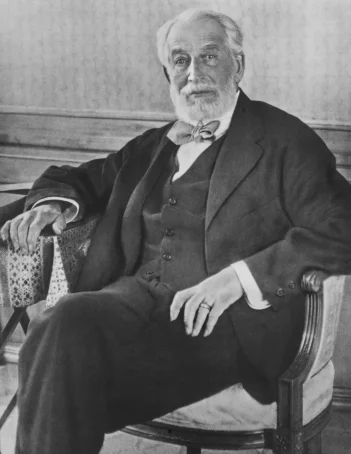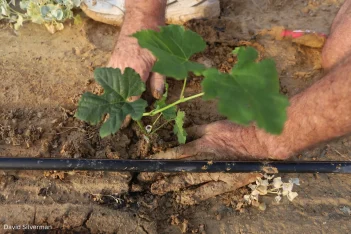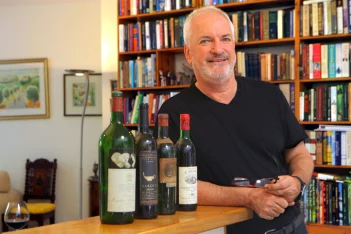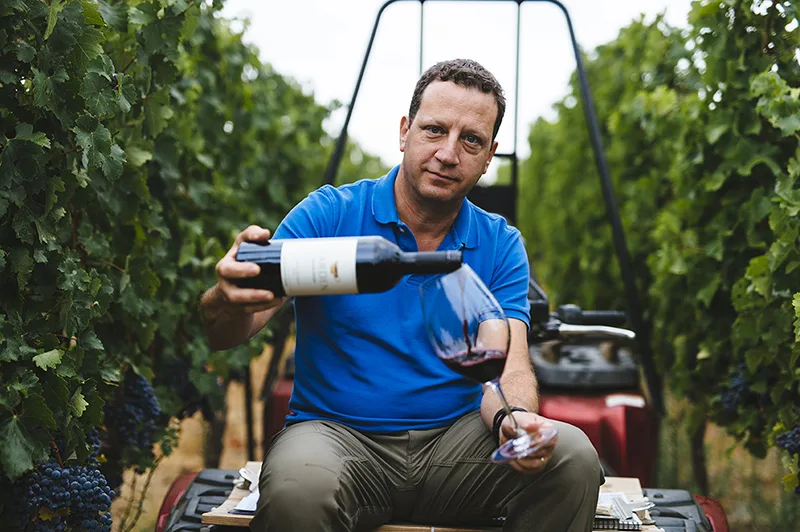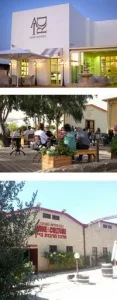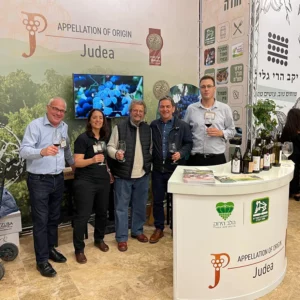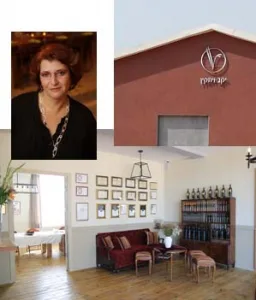I first met him in 1991. He looked about 17, had long straggly, curly hair, round rimmed glasses and spoke with a Californian drawl. In fact, he was really 27 years old and had been appointed for a three-year term to become Head Winemaker of The Golan Heights Winery, then a two million bottle winery. Fast forward thirty years, Victor Schoenfeld has become a legendary figure in the world of Israeli wine.
To set the scene, the largest winery was then Carmel Mizrahi with 75% of the market. The main wineries apart from Carmel and the Golan were Eliaz, Efrat and Askalon (sic.) The so-called Jerusalem wineries (Arza, Hacormim, Shimshon and Zion) and the monasteries (Cremisan and Latroun) were only significant to the markets they served. Barkan had only just been founded out of the ashes of WEST-Stock-Montfort. The largest selling wine was Selected Emerald Riesling. Whites outsold reds. We have come a long way since then!
Victor?s first task was to create order, introduce decision making procedures and minimum standards. He is someone who disdains disorder and ?balagan?. He harnessed the obvious potential of the winery by introducing an infrastructure in keeping with a serious winery. That was his first achievement.
Under his watch, the Golan Heights Winery cemented its position as the pioneer of Israeli wine. The first icon, cult wine of Israel, Yarden Katzrin, was produced. The winery introduced a world class range of Traditional Method Sparkling wines, of which the Yarden Blanc de Blancs became the most famous. Mount Hermon Red became the largest selling Israeli wine. Gamla Cabernet Sauvignon re-emphasized its position offering the best QPR (quality per price) in the NIS 50 ? 100 category and that perennial award winner Yarden Cabernet Sauvignon, became the flagship wine of the country. Victor has won major awards for white, red, sparkling and dessert wines showing praiseworthy versatility, but if we had to pin it down, he would be the ?King of Cabernet? and ?The Master of Sparkling Wines?!? These are the wines most associated with Victor.
The winery was also responsible for the first varietals of Syrah, Pinot Noir & Gewurztraminer (outside Latroun); the first Muscat Canelli, the first organically grown wine, one of the first single vineyard wines, the first in the Moscato style, the first dessert wine made by cryo-extraction (HeightsWine), the first Port style wine from Portuguese varieties. The first wine made from carbonic maceration and so on. The list is endless. There is only so much space.
Victor Schoenfeld has remained the backbone and ballast of the winery and managed to keep it on message and focused for thirty years. He has had four different CEO?s as partners. Not all always signed on to Victor?s long-term vision. His great achievement was not losing sight of his goals, not compromising his standards, but also managing to cajole the management into supporting him. There have been some pretty hefty investments in the vineyards and winery to support that long-term approach.
The rewards came thick and fast. In the nineties, the Golan Heights Winery was the great beacon of Israeli wine. Those new wineries that devoted themselves to quality did so in the image of Yarden and with the example of the winery set before them. As other regions developed like the Galilee and Judean Hills, they followed the emphasis on region that the Golan Heights Winery already practiced on the Golan Heights. Their international recognition put Israel on the wine map. They were the first winery to be invited to the New York Wine Experience. The first Israeli winery to make the Wine Spectator Top 100. The Wine Enthusiast chose them as Best New World Winery. They received the Best Winery Award at Vin Italy. They won the Platinum Medal and 95 points at Decanter WWA. Four stars in Hugh Johnson?s Pocket Wine Book. Again, there is not enough space.
Of course, we worked together for a number of years, bringing some unique memories. One was eating a barbeque together, halfway up Mount Fuji, where I earnt his everlasting respect by eating a sea cucumber. Another was enjoying a magnum of Chateau Lafite 1959 in a small sushi bar in Tokyo, where there was barely room for ten people. We also worked ourselves to exhaustion, many a year at Vinexpo in Bordeaux, bringing Israeli wine to the world. So, I had the opportunity to observe him at close quarters.
Victor Schoenfeld is not always easy and relaxed. He can be as taught as a spring. He does not suffer fools gladly, can?t abide laziness and holds others to his high standards. However, his is arguably the only Israeli winery that has in built quality that may be passed on to the next generation in the manner of say, a Penfolds in Australia.
He does not scatter words like confetti. Everything is considered and mulled over before you hear his opinion. In that split second before he answers, you can almost hear his mind whirring when you ask a question. On the other hand, he has a very dry sense of humor, with a comment often muttered as an aside, that unless you know him well, you will not realize he is joking.
He is at his most relaxed and in his element, when cooking. The Schoenfeld family kitchen is not the pristine affair with all the mod cons that social risers like showing to their neighbors. It is used, lived in and rather like a galley kitchen with overflowing shelves on all sides. Good restaurants have less condiments and pots and pans of every description. It is also like an altar. The raised table and hob in the center of the organized chaos is where the hands-on cook creates, innovates with a total spontaneity. Here he is free from procedures, standards and responsibilities. He potters around the kitchen, busy, yet fulfilled and totally locked into food flavor creation. He never cooks the same dish twice and does not follow recipes, even though the shelves are creaking from the number of cook books.
If I say he has six grills which he possessively hangs on to, you understand the fetish. Once I was with him in Japan. We had to do a detour to buy a Japanese knife. Even though he acknowledged he would probably get it in the neck for buying ?yet another? Japanese knife, he could not help himself.
In fact, food was his way into winemaking.? He wanted to be a farmer and grow food. Fortunately for us, the 1980s was a nadir of commercial food production. Appearance, shelf live and distribution were then more important than flavor, individuality and a perception of quality. However, this was not true of viticulture or growing wine. He was introduced to wine (in particular Italian reds) by the father of a friend. He studied at UC Santa Cruz and UC Davis. He worked for wineries such as Robert Mondavi Winery in Napa Valley, Chateau St. Jean in Sonoma, Jacquesson et Fils in Champagne, and even squeezed in a year to manage a vineyard at Tishbi Winery in Israel.
The key to his love of wine is that he sees wine as a food, not a drink. Wine is to enjoy with a meal. He believes you have to humble as a winemaker. He himself is the antithesis of the ?I, me and mine? winemaker, who loves to tell you what they have done and how good they are. We have a? few of those in Israel. With Victor you have to prompt and almost squeeze it out of him. Once I witnessed Japan?s most famous sommelier ask him: ?Of the wines you make, which is your favorite?? Victor paused, as though scratching his head in his mind, clearly struggling with an answer. Then he replied: ?You know,? another pause? ?I am not really happy with any wine I make.? He went on: ?I always see the faults.? Unrehearsed, honest to a fault and revealing, he gave the answer that sums up the pursuit of excellence, the modesty and constant desire to improve. Sometimes he and his winemaking team say ?just think, only five years ago we knew nothing?, such is weight of constant new information, developing technology and ongoing learning. As Victor says ?the past is unimportant. What is of interest, is the future.?
The Golan Heights Winery is now nearly a six million bottle winery. Victor is responsible for 26 people. These include five winemakers, viticulturists, wine growers and the laboratory team. Any winery in the world would be proud to have the data base of vineyard information he has at his disposal. They practice precision agriculture with the most sophisticated irrigation management and green practices such as composting and wind generated electricity. Each vineyard block is mapped and catalogued, with constant monitoring of temperature, soil conductivity, growth and water. The Golan Heights vineyards are the most studied and analyzed agricultural land in Israel. Paradoxically, Schoenfeld explains that the more information he has at his fingertips, the more it allows him to enable the vine to speak for itself. He wants the wine to represent the terroir, not the winery or the winemaker.
The Golan Heights Winery certainly set the standard, but Schoenfeld also initiated changes that will positively affect the whole industry. It is a sad fact that Israeli vineyards are crippled by virus and the authorities have been paralyzed like a rabbit caught in the headlights of a car. The lack of ownership for the chronic problem is astonishing. Instead of whining and bleating, or a wringing of hands, the Golan Heights Winery created its own Nursery & Propagation Block, partnering with world leaders ENTAV-INRA. The primary reason is to provide its own vineyards with clean plant material, but a secondary benefit will be to supply the industry.
This should have been the remit of the Ministry of Agriculture or the Wine and Grapes Board, but the official response has been woefully inadequate. This program necessitated an astonishing investment by a winery, which was fraught with risk. When the group of Masters of Wine visited, most said they had never visited a Nursery & Propagation Block, and certainly not one developed by a winery. Ido Lewinsohn MW, winemaker of Barkan Winery, wrote about the leafroll virus in his dissertation to become a Master of Wine. It does not make optimistic reading.
The Golan Heights Winery did not talk, but acted. Credit for the decision goes to the winery management. Success has many fathers, but the person who made the case for this long-term investment and successfully implemented this incredibly ambitious program was Victor Schoenfeld and his team. The proof of the pudding is in the eating. The new Allone Habashan single vineyard wines illustrate the success of this initiative.
In 2012 IPEVO, the Israeli Professional Enology & Viticulture Organization, was founded. There had been previous attempts to create a winemakers? forum, but these were more social in character, lacked serious content, were disrupted by a need for public relations and did not last. This one operated like a secret society. We all knew it existed but not what went on, apart from the fact that attendance was good and lectures or presentations were serious and worthwhile. In 2018 it was registered as a government non-profit association. I have heard how valued it is by participating winemakers. I don?t know for sure, but I have an inkling Schoenfeld may have been involved.
The first outing in a way was the publishing of the IPEVO Israel wine map. Israel has been totally incompetent in the last thirty years in updating the map of registered wine regions to match topography, marketing needs and the developments in the Israeli wine scene. This map, though it needs polishing and some marketing input, is a good basis and because of the inertia, will be used until the officials get their act together. IPEVO is an important body on the Israeli wine scene.
Schoenfeld volunteers his time as member of the Standards Institution of Israel. He was part of a committee that updated the Wine Standards for the first time in ages. This is important work to bring the local wine industry up to speed.
Now the winery has taken another major step by moving to a program of sustainable vineyards. Yet again, the Golan Heights Winery are the pioneers and they are the first Israeli winery to be internationally certified sustainable. As with the cooperation with ENTAV, they have chosen leaders of the field to collaborate with, in this instance, LODI RULES from California. Certified sustainable farming is all encompassing and relates to the environment, the people and the business. I have always thought sustainability is important for Israeli wineries and is only more so in the current environment along with the climate of opinion. It is also a good partner for Kosher. It all sounds more logical from a marketing point of you, when wrapped up together. Schoenfeld says ?We hope to act as a model for others in the Israeli wine industry in order to promote sustainability in our industry as a whole.?
He is bullish about Israeli wine. Sometimes I talk about how good we are, and then qualify it. Victor does not believe we have to apologize for anything. He explains we are a unique wine region with a melting pot of winemaking skills, and we should approach the world with more self-confidence. As for the Golan he says ?There is nowhere else on the planet that combines our latitude, which is a meeting place between Europe, Africa and Asia, with our high altitude and beautiful volcanic soils.? He explains wine is the only product that combines agriculture, industry and tourism and enchantingly, he describes wine drinking as a kind of armchair tourism.
Wine is an important industry in Israel. It is relatively small but high profile. There is no other product that runs like a thread from the beginnings of the Jewish people and from the first contact with the Land of Israel, until today. Hi-tec maybe a larger sector, but it is intangible and you can?t give someone a gift of a bottle of hi-tec. I have long thought that the Israeli wine should be recognized nationally. Would it not be appropriate for a representative of our industry to be awarded with the prestigious Israel Prize, in recognition of the tremendous strides made in the sector? If Israeli wine were a team in the Olympics, Victor Schoenfeld would be carrying the flag. I can think of no-one else who symbolizes all the positive developments quite like him.
Thirty years is but a blip in time in the life of a wine region. After all, that is only thirty harvests. As Baroness Philippine de Rothschild said: ?Winemaking is easy, it is only the first 200 years that is difficult.? Fortunately, we will have the benefit of Victor?s passion, hunger and perfectionism for a good many more years to come.
Adam Montefiore is a wine trade veteran, who has advanced Israeli wine for 35 years. He is referred to as ?the English voice of Israeli wine.?? He is the wine writer of the Jerusalem Post. www.adammontefiore.com












